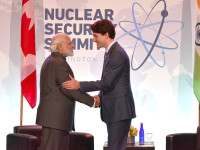Earlier this year, I posted on the cultural implications of the TPP, noting that the agreement represents a departure from trade deals by creating restrictions on Canadian cultural policy. Assuming services such as Netflix argue that any mandated Cancon contribution is discriminatory if they do not also receive the benefits accorded to established broadcasters or broadcast distributors, the TPP will effectively ban applying Cancon contributions to exempt entities.
Now it appears that the implications of the TPP for Canadian cultural policy are beginning to attract attention. Question period in the House of Commons featured the following exchange this week:












